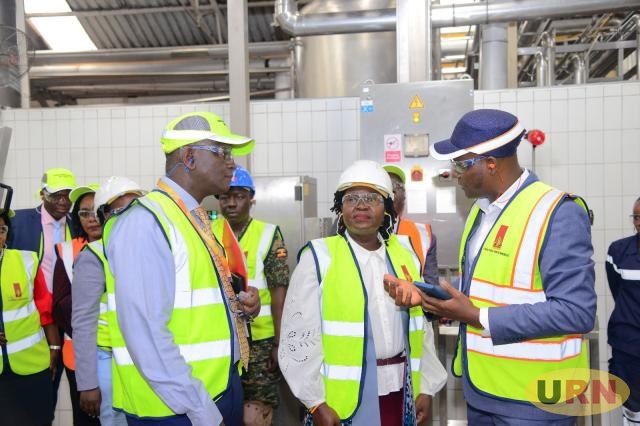
SPECIAL REPORT | THE INDEPENDENT | Uganda is poised to reduce its carbon emissions by an additional 8000 tons, following the installation of a new Biomass steam plant by Uganda Breweries Limited (UBL).
This reduction marks another stride towards the country’s revised target of reducing greenhouse gas output by 24.7 percent below business-as-usual levels, as outlined in its Nationally Determined Contributions (NDCs).
Statistics from the Ministry of Water indicate fluctuations in the country’s carbon emissions over the years, with a 4.52% decline recorded in 2020 compared to the previous year.
Minister of Energy and Mineral Development, Ruth Nankabirwa, emphasized the collective significance of this achievement, stating, “This achievement is not for Uganda Breweries alone; it’s a contribution to the country,” adding that the UBL plant will be highlighted in her report at the next COP meeting.
Nankabirwa pledged support for the plant’s optimal operation and encouraged other processors and manufacturers to follow suit to both preserve the environment and bolster other sectors, considering the plant’s fertilizers as one of its by-products.
In line with government efforts to curb greenhouse gas emissions, Nankabirwa urged UBL to integrate solar power alongside the Biomass steam plant..
Callist Tindimugaya, Director of Water Resource Management in the Ministry of Water and Environment, acknowledged the plant’s significance in the broader goal of reducing greenhouse gas emissions. He highlighted its alignment with water conservation objectives through steam production.
Tindimugaya emphasized the plant’s demonstration of efficient resource utilization for the benefit of the Ugandan populace and encouraged knowledge exchange among factories for collective progress.
Andrew Kilonzo, UBL Managing Director, underscored the plant’s role in the company’s sustainability plan of achieving net-zero emissions by 2030 and addressing societal challenges.
He noted a significant reduction in the factory’s carbon emissions by 92 percent compared to previous petroleum fuel usage. The installation of the plant cost 37 billion shillings, according to Kilonzo.
******
URN
 The Independent Uganda: You get the Truth we Pay the Price
The Independent Uganda: You get the Truth we Pay the Price



